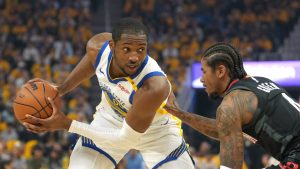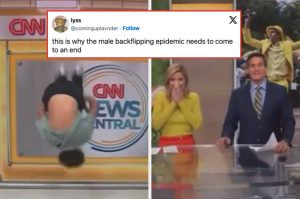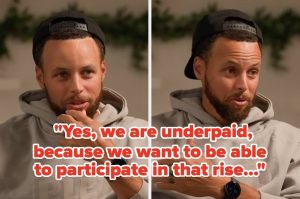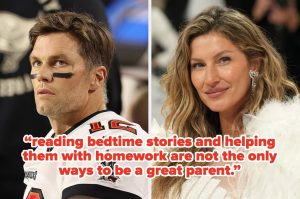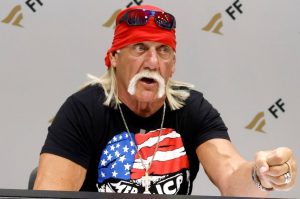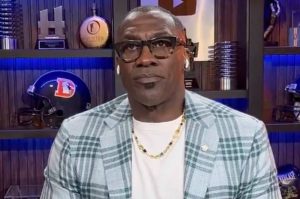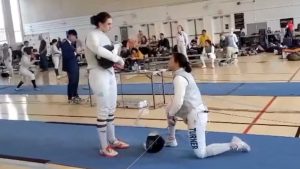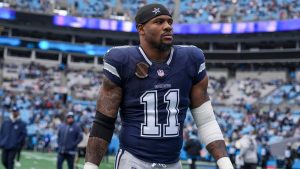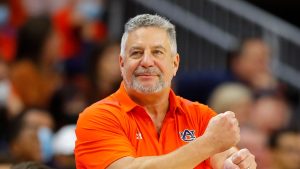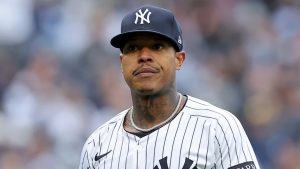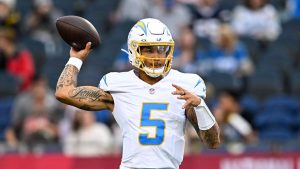Although Zaccharie Risacher was selected with the first overall pick this year, he could struggle to carve out a role as a rookie. Alex Rikleen breaks down which rookies could surprise this season.
Pelicans rookie center Yves Missi tops the list of rookies who could surprise in fantasy basketball leagues this season. (Photo by Candice Ward/Getty Images)
The worst rookie class of the last 20 years, 2013-14, produced three players who finished with a theoretically roster-worthy fantasy basketball rank (there are 156 players rostered in a standard league, so players who ranked at or above 156th). That was the infamous Anthony Bennett draft. Yet, for all its faults, that class still had large fantasy impacts in the short- (Michael Carter-Williams), medium- (CJ McCollum), and long-term (Giannis Antetokounmpo and Rudy Gobert).
[Create or join a Yahoo Fantasy hoops league for the 2024-25 NBA season]
Most years, rookies make an even larger impact. Roughly three rookies per season finish with a top-100 rank on average — a rank equivalent to a regular fantasy starter. In some recent seasons, we’ve seen double-digit rookies rank above 156th.
This rookie class likely will be worse than several recent draft classes, but the first-year players will still impact the upcoming fantasy season. With the expectations so low, the rookies who do succeed could provide additional value.
Let’s look at some rookies who could surprise in fantasy basketball leagues this season:
Yves Missi, New Orleans Pelicans
The Pelicans are in an interesting spot. They have a deep roster, plenty of talent and a potential superstar, yet they are widely projected as a middle-of-the-pack team in the Western Conference. Part of their problem is their mismatched roster. On offense, their six best players all play either point guard or small forward. On defense, those same six include two lock-down wing defenders, one player who defends guards, and three players you hope to hide on the opposing team’s aging power forward. Notably missing: anyone who plays center.
Enter Missi, a 20-year-old out of Baylor selected with the 21st pick in last June’s draft. While pro comps for draft prospects are often problematic, one name is unavoidable for Missi: Clint Capela. If Missi hits as a pro, then his skill set will likely be similar to Capela’s game. Strong defensive fundamentals, high athleticism, weak shooting, good rebounding and around-the-rim finishing.
In the seasons when Capela averaged between 23 and 27 minutes per game, he was a top-100 fantasy option despite abysmal free-throw percentages, buoyed by high field-goal percentages and solid defensive stats. That probably represents an absolute best-case-scenario outcome for Missi, but it’s not totally unrealistic if he can secure the starting job.
The Pelicans don’t have much depth at center heading into the season, giving Missi an unusually smooth pathway to minutes. It’s possible he could begin the year as a starter, but nothing is guaranteed. Veteran Daniel Theis is capable of handling decent minutes. Also, the Pelicans’ front office knows that they have the weakest center depth in the league, and they are probably brainstorming ways to address that.
Kyle Filipowski, Utah Jazz
At first glance, Filipowski is buried on the Jazz’s depth chart. However, what if they finally find an acceptable deal for John Collins? Walker Kessler shined as a rookie, but the Jazz have been notably hesitant to commit to the shot-blocking specialist.
There are several teams (like the Pelicans) in desperate need of big man help, and the Jazz would likely be willing to part with both of their top two centers. Filipowski projects to have a well-rounded and fantasy-friendly skill set, but the primary obstacle is the workload. Perhaps it’s far-fetched to imagine both Collins and Kessler being sent out in trades, but it’s more plausible for the Jazz than it would be for most other teams.
Matas Buzelis, Chicago Bulls
Like many of the most prominent names from June’s draft, Buzelis was drafted as a backup. The Rockets added Reed Sheppard to a backcourt that already featured two recent top-four picks and their biggest free agent acquisition in a decade. The Pistons selected Ron Holland, who theoretically plays the same position as their No. 5 pick from last season, Ausar Thompson. The Trail Blazers drafted Donovan Clingan, but they still have Deandre Ayton and Robert Williams. The Heat selected Kel’el Ware, who will sit behind Bam Adebayo. Those are the most prominent examples, but there are more — it was a bizarre theme of this year’s draft. All of these rookies would likely have fantasy value if the starters above them were unavailable, but their current upside is limited.
Buzelis could be a surprising option by carving out fantasy value even while Patrick Williams remains healthy. Simply put, I’m not impressed by Williams, and I think Buzelis could thrive in Chicago. Williams was the No. 4 pick in the 2020 NBA Draft, and he was once seen as a foundational building block for the franchise. He’s still only 23 years old, but few envision a lofty ceiling for him anymore. He signed a five-year extension this summer worth $18 million per year. At first glance, that may seem like a hefty salary, but in the modern NBA, that’s what a fifth starter or sixth man earns. The Bulls recognize that his role will be limited going forward.
Buzelis fell to No. 11 on draft night, but he was often projected in the Top 5, a reflection of his incredible athleticism and great frame. He can rack up defensive stats, averaging 2.0 steals and 2.0 blocks during Summer League play. I’m also impressed by his intangibles. For example, he’s clearly making efforts to improve at his biggest weaknesses: his lack of aggression and inability to get to the free-throw line was often highlighted as a weakness in draft profiles. However, after Summer League play, it was specifically mentioned as a strength.
It won’t happen right away, but I wouldn’t be surprised if Buzelis takes the starting power forward job away from a healthy Williams during the season.
Zaccharie Risacher, Atlanta Hawks
Based on early ADPs, Risacher is going unusually late for the No. 1 overall pick. As of late September, he’s the 10th rookie being selected on Yahoo. An ADP outside the top 150 overall and outside the top five rookies might be unprecedented for a healthy top pick.
The “surprise” I’m predicting is that this low ADP is still too optimistic.
The Hawks are set up to be a competitive team, as BetMGM’s over-unders project them as the No. 9 seed, right in the middle of the Eastern Conference race for the Play-In Tournament. They have more centers than they have minutes for, so there is limited flexibility or appetite for small-ball lineups to carve out extra minutes for their big wings. Besides Trae Young, Jalen Johnson is their most important player, and he’ll continue to dominate the minutes at power forward. Risacher’s minutes, therefore, will likely have to come as either the backup power forward or at small forward. However, there’s also competition at small forward, most notably from De’Andre Hunter, the Hawks’ third-highest paid player. Unlike most top picks, Risacher’s floor for minutes is very low.
It’s not just the potentially low minutes load, however. What if Risacher struggles to adjust to the NBA level? He’s a 19-year-old underweight wing shooter who shot less than 70 percent from the free-throw line last season. There are three red flags in that one sentence when it comes to 2024-25 fantasy value. He’s shown minimal ability to record assists.
Though Risacher profiles as someone with defensive potential, he’s unlikely to block shots under coach Quin Snyder. Throughout Snyder’s career, Jalen Johnson is the only non-center to ever block more than 0.5 shots per game. This is not due strictly to personnel, as multiple wings topped that mark the season before or after being coached by Snyder.
Risacher could work out as a long-term prospect. However, for this season, I think many fantasy managers will be surprised at how ineffective he is. I wouldn’t target him in fantasy drafts, even in deeper leagues.

